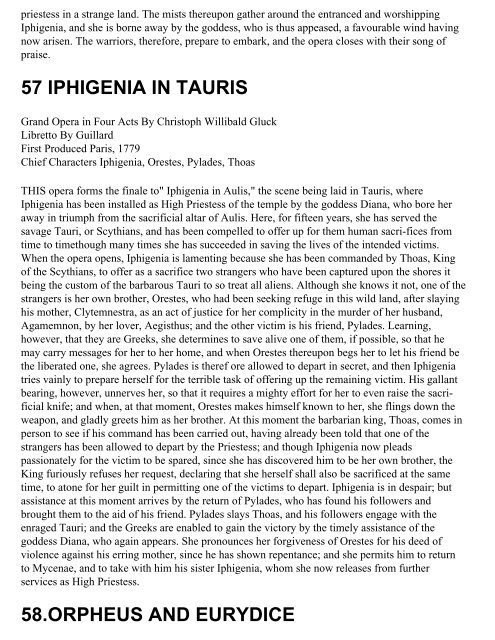Opera Plots I - MDC Faculty Home Pages
Opera Plots I - MDC Faculty Home Pages
Opera Plots I - MDC Faculty Home Pages
You also want an ePaper? Increase the reach of your titles
YUMPU automatically turns print PDFs into web optimized ePapers that Google loves.
priestess in a strange land. The mists thereupon gather around the entranced and worshipping<br />
Iphigenia, and she is borne away by the goddess, who is thus appeased, a favourable wind having<br />
now arisen. The warriors, therefore, prepare to embark, and the opera closes with their song of<br />
praise.<br />
57 IPHIGENIA IN TAURIS<br />
Grand <strong>Opera</strong> in Four Acts By Christoph Willibald Gluck<br />
Libretto By Guillard<br />
First Produced Paris, 1779<br />
Chief Characters Iphigenia, Orestes, Pylades, Thoas<br />
THIS opera forms the finale to" Iphigenia in Aulis," the scene being laid in Tauris, where<br />
Iphigenia has been installed as High Priestess of the temple by the goddess Diana, who bore her<br />
away in triumph from the sacrificial altar of Aulis. Here, for fifteen years, she has served the<br />
savage Tauri, or Scythians, and has been compelled to offer up for them human sacri-fices from<br />
time to timethough many times she has succeeded in saving the lives of the intended victims.<br />
When the opera opens, Iphigenia is lamenting because she has been commanded by Thoas, King<br />
of the Scythians, to offer as a sacrifice two strangers who have been captured upon the shores it<br />
being the custom of the barbarous Tauri to so treat all aliens. Although she knows it not, one of the<br />
strangers is her own brother, Orestes, who had been seeking refuge in this wild land, after slaying<br />
his mother, Clytemnestra, as an act of justice for her complicity in the murder of her husband,<br />
Agamemnon, by her lover, Aegisthus; and the other victim is his friend, Pylades. Learning,<br />
however, that they are Greeks, she determines to save alive one of them, if possible, so that he<br />
may carry messages for her to her home, and when Orestes thereupon begs her to let his friend be<br />
the liberated one, she agrees. Pylades is theref ore allowed to depart in secret, and then Iphigenia<br />
tries vainly to prepare herself for the terrible task of offering up the remaining victim. His gallant<br />
bearing, however, unnerves her, so that it requires a mighty effort for her to even raise the sacrificial<br />
knife; and when, at that moment, Orestes makes himself known to her, she flings down the<br />
weapon, and gladly greets him as her brother. At this moment the barbarian king, Thoas, comes in<br />
person to see if his command has been carried out, having already been told that one of the<br />
strangers has been allowed to depart by the Priestess; and though Iphigenia now pleads<br />
passionately for the victim to be spared, since she has discovered him to be her own brother, the<br />
King furiously refuses her request, declaring that she herself shall also be sacrificed at the same<br />
time, to atone for her guilt in permitting one of the victims to depart. Iphigenia is in despair; but<br />
assistance at this moment arrives by the return of Pylades, who has found his followers and<br />
brought them to the aid of his friend. Pylades slays Thoas, and his followers engage with the<br />
enraged Tauri; and the Greeks are enabled to gain the victory by the timely assistance of the<br />
goddess Diana, who again appears. She pronounces her forgiveness of Orestes for his deed of<br />
violence against his erring mother, since he has shown repentance; and she permits him to return<br />
to Mycenae, and to take with him his sister Iphigenia, whom she now releases from further<br />
services as High Priestess.<br />
58.ORPHEUS AND EURYDICE













